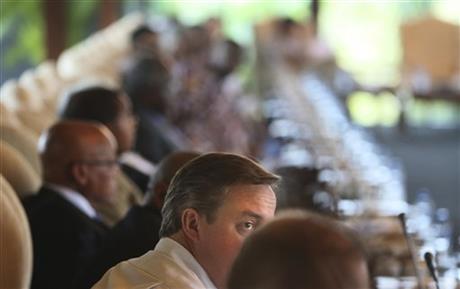
By KATY DAIGLE
British Prime Minister David Cameron, center, talks with other leaders during a retreat at the Commonwealth Heads of Government meeting, in Colombo, Sri Lanka , Saturday, Nov. 16, 2013. Sri Lanka remained defiant against unending calls for an independent inquiry into alleged war crimes and abuses during its 27-year civil war – setting the stage for an international showdown as Britain’s leader pledged to press the issue with the United Nations if no progress is made by three months. (AP Photo /Manish Swarup)
David Cameron
British Prime Minister David Cameron sits with other heads of nation during a retreat at the Commonwealth Heads of Government meeting, in Colombo, Sri Lanka, Saturday, Nov. 16, 2013. Sri Lanka remained defiant against calls for an independent inquiry into alleged atrocities committed during its 27-year civil war – setting the stage for an international showdown as Cameron pledged Saturday to press the issue with the United Nations if no progress is made in three months. (AP Photo/Manish Swarup)
Kamalesh Sharma, Mahinda Rajapaksa, Najib Razak
Commonwealth Secretary-General Kamalesh Sharma, right, talks to Sri Lankan President Mahinda Rajapaksa, center, as Malaysian Prime Minister Najib Razak, left, reads during a retreat at the Commonwealth Heads of Government meeting in Colombo, Sri Lanka , Saturday, Nov. 16, 2013. (AP Photo /Manish Swarup)
Prev
1 of 3
Next
COLOMBO, Sri Lanka (AP) — Sri Lanka remained defiant Saturday against calls for an independent inquiry into alleged atrocities committed during its civil war, while Britain’s leader pledged to press the issue with the United Nations if no progress is made by March, setting the stage for an international showdown.
British Prime Minister David Cameron said he held a “frank” discussion Friday night with Sri Lankan President Mahinda Rajapaksa. Cameron had skipped the first day of Commonwealth summit meetings to travel to Sri Lanka’s war-torn north on a fact-finding mission.
“Not everything I said was accepted, but I sense they do want to make progress on these issues, and it will help frankly by having international pressure in order to make sure that that happens,” Cameron told reporters.
He said he believed an independent investigation was of prime importance, as well as guarantees of press freedom and the resettlement of people displaced by the 27-year war, which ended in 2009.
“Let me be very clear: If that investigation is not completed by March, then I will use our position on the U.N. Human Rights Council to … call for a full credible independent international inquiry,” Cameron said.
Sri Lankan government ministers said Cameron’s comments interfered with Sri Lanka’s sovereignty.
“We will resist an international inquiry. That is the policy of the government,” the water minister, Nimal Siripala de Silva, told reporters.
He dismissed the threat of U.N. pressure as “nothing new,” after several years of outcry from international human rights groups, the United Nations and Western governments, including the United States.
Later Saturday, Rajapaksa told reporters that he had already appointed several internal inquiry commissions — still falling short of international demands.
“We have done what we can do,” he said. “We need time to settle these things.”
He also questioned Cameron’s approach, saying “pressure won’t do anything” to sway Sri Lanka.
A U.N. report has suggested Sri Lanka’s Sinhalese-dominated armed forces may have killed up to 40,000 minority Tamils toward the end of the war. Ethnic Tamil rebels who were fighting for a homeland have been accused of killing civilians, using them as human shields and forcibly recruiting child soldiers. Recent reports of media harassment and rights abuses have also raised alarms.
Cameron said that while he was impressed with Sri Lanka’s “immense potential,” he was moved by his visit north, where he met some of the hundreds of ethnic Tamils still living in camps after their homes and lands were seized during the war.
He said Britain would provide nearly $3.4 million for demining areas in the north, though Sri Lanka’s military spokesman said Saturday that 96 percent of demining was already complete.
Rajapaksa says that the army committed no abuses, and that the country’s courts and other institutions can handle any complaints.
His assurances rang hollow with the International Bar Association’s Human Rights Institute, which called out a lack of judicial independence that prevented any credible Sri Lankan investigation.



